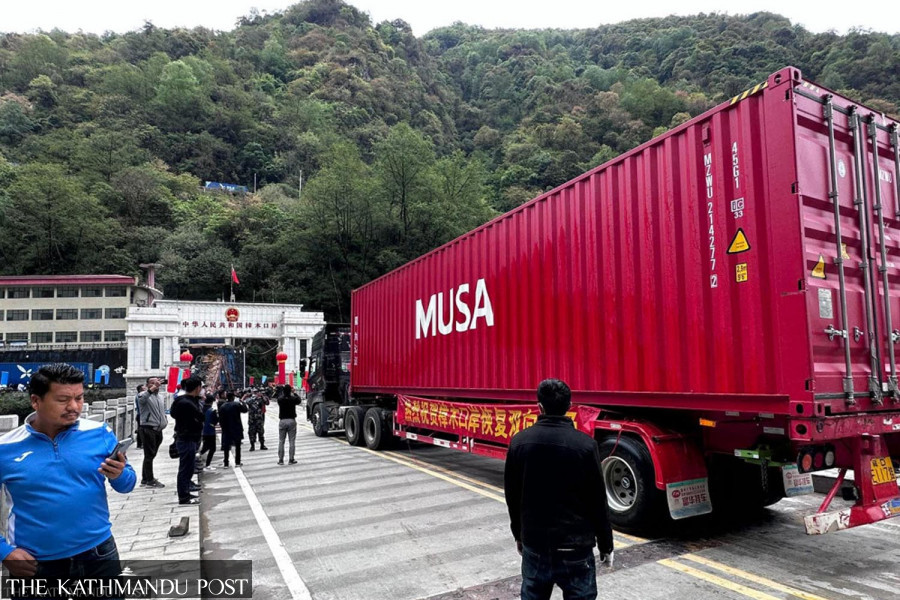Money
Nepali traders fed up with China’s random border policy
The Tatopani border point re-opened on May 1 after remaining closed for eight years then closed again the next day.
Krishana Prasain & Anish Tiwari
China has stopped Nepali exports through the Tatopani border point saying there is no demand for the products, according to officials.
The northern neighbour had re-opened the Tatopani border point on May 1 allowing trade to resume after a break of eight years. Three container-loads of bamboo stools, rattan chairs and mattresses then passed across Miteri Bridge on Chinese trucks as Nepali vehicles are not permitted to enter China.
But the next day on May 2, the border was slammed shut again.
“Three containers loaded with plastic utensils have been stranded at the customs yard since May 2,” said Dayananda KC, chief of the Tatopani Customs Office.
“A Chinese agent informed us that there is no demand for such goods,” he said. “The traders are paying Rs5,000 to Rs10,000 in charges daily to the customs.”
The Tatopani-Khasa trade route across the northern border was first closed after the earthquake of April 2015 destroyed the infrastructure. Following the re-opening of two-way trade, traders and locals had become very excited. But the elation did not last long.
KC said five to six containers were arriving in Nepal daily from China. “Imports have increased due to the large volume of goods imported for various development projects, particularly hydropower,” he said.
Before the April 2015 earthquakes, Nepal’s exports to China were booming. Nepal used to send handicrafts, herbs, noodles and hundreds of other goods to Khasa, Shigatse and Lhasa in Tibet.
"Chinese traders have stopped placing orders for Nepali goods. We are in a wait-and-see mode,” said Bijaya Sherpa of the Silk Group.
“As soon as the border was re-opened, Chinese traders had ordered some goods. The Silk Group was preparing to ship various products worth Rs1.96 million. But it’s uncertain now.”
Rajkumar Basnet, president of the Sindhupalchok Chamber of Commerce and Industry, said the Kerung border point was fully open, but exports through Tatopani had been stopped.
“Imports too are not happening as expected. China has reduced trade through Tatopani border under different pretexts. We have become fed up submitting memorandums to the government regarding the opening of the border in a full-fledged manner,” Basnet said. “When will the Tatopani border point operate normally?”
According to him, it takes 12-15 days for goods ordered from any Chinese market or company to arrive in Tatopani from Khasa.
The Tatopani border point, some 115 km northeast of Kathmandu, has historically been the main land route for trade with China. In the past, porters and mule caravans carried merchandise over the Himalayan passes to various points in Tibet.
Arniko Highway linking Kathmandu and Kodari, which opened in the late 1960s, retraces the old trade route.
The Tatopani Customs Office used to collect more than Rs15 million in revenue daily before the border closed following the earthquake.
Prior to that, apples, garlic, wool, clothes and equipment for hydropower projects used to arrive at the Tatopani border. More than 600 workers loaded and unloaded goods at the customs yard.
According to officials, around 13 goods-carrying containers used to cross the border into Khasa from Nepal, while 100-150 Chinese containers used to arrive daily in Nepal during the town’s heyday.
Local trader Dorje Lama said exporting goods to China involved many hassles.
“Chinese authorities check the goods by unloading them. As a result, it takes around a month for a container to get clearance,” Lama said. “This rule has been reapplied since May 1, and imports have started to decrease.”
Kumar Shrestha, chairman of Bhotekoshi Rural Municipality-2, said that locals and traders who were elated that their business would recover after China announced reopening two-way trade are disappointed again.
"Everybody is fed up with the abruptly changing policy of China. This shows that China has still not prioritised the Tatopani border,” he said.
Traders and workers of various companies like Silk, Rewang and Rising Star, who were hopeful about the resumption of hassle-free trade through Tatopani, are gradually starting to move to Kerung further west.




 13.12°C Kathmandu
13.12°C Kathmandu














